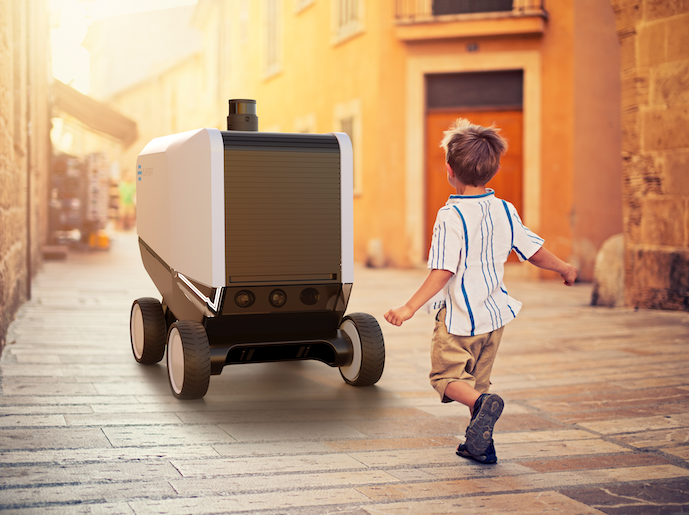Automated robots set to deliver packages to your home
With an annual growth rate of 25 %, in 2017 the e-commerce market in the Middle East and North Africa reached EUR 7.5 billion – well ahead of the global average. To keep up with this always increasing demand, many logistics and parcel companies, as well as cities and urban areas, are turning to automation. From warehouses to sorting facilities, smart storage systems, analytics and inventory management, logistics is becoming increasingly automated. As a result of this trend towards automation, the industry has not only optimised delivery times, it has also cut costs – a saving that can be passed on to the consumer. However, there remains one component to the delivery chain that remains inefficient and manual: the last mile delivery. “Despite all the automation along the delivery value chain, the final step – when the package is delivered to your door – is still done by a human courier,” says Dmitry Skorinko, co-founder of Eliport(opens in new window), a robotics start-up. “This is where autonomous delivery vehicles like Eliport come in, saving the industry money and helping our cities become smarter.”
Last mile delivery
With the support of EU funding, Eliport is developing and testing a fully autonomous robotic delivery system. “Our goal is to develop and deploy a delivery system consisting of robotic logistics hubs, private post boxes, and a fleet of autonomous, self-loading and unloading ground-based robots,” explains Skorinko. “In doing so, we are filling the last gap in achieving a fully automated supply chain.” The Eliport prototype was designed to provide ‘last mile’ delivery solutions to businesses and communities. Each robot is programmed to automatically travel in pedestrian-designated spaces and cover the distance between the pick-up point (e.g. final logistics point) and the drop-off point (e.g. the customer’s home). Packages are delivered to specially designed, robot-compatible post boxes that the robot can open by itself. Like a traditional post box, the Eliport boxes are installed at the delivery’s final destination. These post boxes can only be accessed by Eliport robots, the intended recipient of the delivery, or somebody with a unique code (e.g. worker, courier, postal worker). “At Eliport, we are going one step further than any other company because we intend to completely automate the entire last mile delivery process,” adds Skorinko. “We are building a technology that we believe will change transportation channels and how we order and consume, improving our cities for everybody’s benefit, and delivering a positive social and environmental impact to our planet.”
Identifying the right market
Although building and successfully testing the self-loading/unloading robot prototype was an important outcome of the EU-funded project, even more important was identifying the right market for the solution. For Eliport, that market is the Middle East. “On the one hand, there is a lack of competition from US-based robotics companies in the Middle East,” explains Skorinko. “On the other, as Middle Eastern governments look to transition away from oil and gas-based economies, there is a huge appetite to invest in new tech companies.” Skorinko notes that the Middle East’s cultural environment also creates specific opportunities for robotic service automation: “In many countries, there are limitations on when people are allowed to work. In this sense, there is a very practical need for robots to continue providing services, such as deliveries, even when people cannot.”







